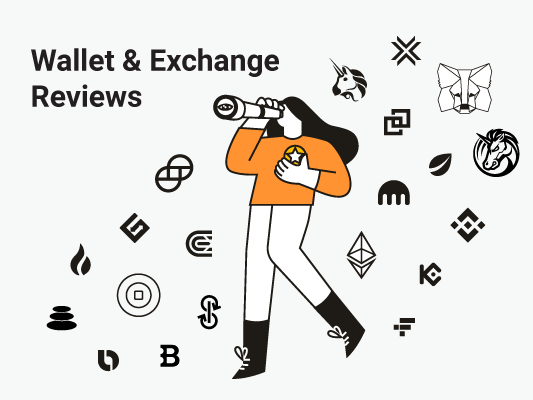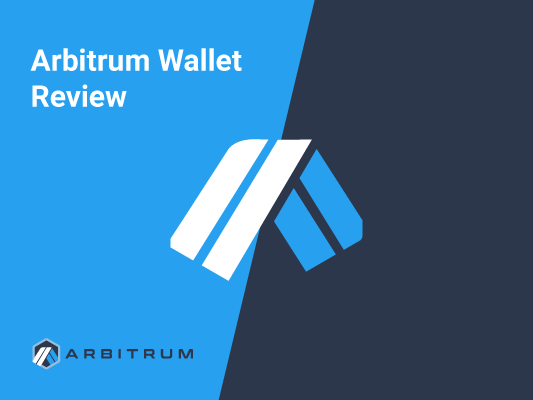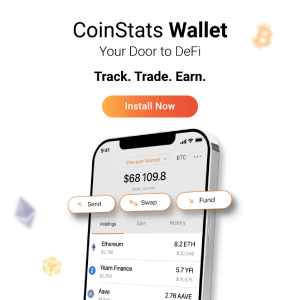
Reviewing the Top Wallets and Exchanges
Cryptocurrency trading has brought a sweeping change in the financial world, and people’s interest in crypto has skyrocketed. Crypto coins are gaining traction as part of a well-balanced portfolio, and there has been a massive increase in Decentralized finance (DeFi) applications, products, and financial services. Most importantly, one needs to open an account with a cryptocurrency exchange and create a cryptocurrency wallet to trade crypto coins.
To help you find the suitable exchange and the best crypto wallet, we’ve selected a list of the most popular ones in the crypto world and looked into their essential factors such as supported coins, user interface, fees, payment methods, two-factor authentication, security, etc.
Let’s jump right in!
Cryptocurrency
Cryptocurrencies are virtual or digital currencies that use cryptography to secure crypto transactions, making it almost impossible to double-spend or counterfeit. They are decentralized digital money based on blockchain technology that isn’t issued and managed by any central authority, making a cryptocurrency theoretically immune to government manipulation or interference. Crypto trading is based on a peer-to-peer system that allows anyone to receive or send payments using a mobile device and without any intermediary. Cryptocurrency gained its name because it uses encryption to secure and verify transactions, meaning that advanced coding is involved in transmitting and storing crypto data between public ledgers and wallets.
How Cryptocurrency Works
“Crypto” refers to the various cryptographic techniques and encryption algorithms that safeguard these entries, such as public and private keys, elliptical curve encryption, and hashing functions. Crypto assets can be mined or purchased from cryptocurrency exchanges. Mining involves generating coins by using computing power to solve complex mathematical problems. Crypto users can buy and sell cryptocurrencies on various exchanges and store crypto assets in cryptocurrency wallets.
Cryptocurrency Exchanges
A cryptocurrency exchange is a digital marketplace where one can trade in cryptocurrencies, NFTs, and even stake their crypto holdings to earn interest on them. Crypto exchanges provide you with accounts to create different order types to speculate, sell, or buy in the cryptocurrency market. They offer relatively low fees and provide advanced performance charts. While not all exchanges provide every cryptocurrency in circulation, you can buy Bitcoin (BTC) and other major cryptocurrencies like Ethereum (ETH) and Litecoin (LTC) on most exchanges. Some popular exchanges that offer trading options, including Bitcoin, Bitcoin Cash, Litecoin, Ethereum, and Coinbase USD coin, are Binance, Coinbase, and Kraken.
It’s essential to look at their various features when choosing a cryptocurrency exchange. Many exchanges impose geographical restrictions on users who want to buy crypto. Because of regulatory reasons, residents in certain states cannot use specific platforms. With most exchanges, you can connect a debit card or a traditional bank account to deposit fiat currency into your exchange account. Remember that not all exchanges allow you to make cryptocurrency investments with credit cards due to the risk of fraud. The payment method you use to fund your account attracts different fees; typically, card options cost more than bank transfers. Several exchanges offer wallet options so you can quickly transfer digital assets from your exchange account to other wallets. Some exchanges support advanced trading features like futures or margin trading; however, these are less commonly available to United States residents. Other exchanges offer crypto loans or crypto staking features that allow you to accumulate interest on your cryptocurrency holdings. Some of the best exchanges provide educational resources to keep you updated on everything crypto.
Crypto exchanges are broadly divided into two categories: a decentralized exchange (DEX) and a centralized exchange (CEX), each with its disadvantages and advantages. The decentralization degree plays an essential role in how the exchanges conduct their transactions, and it affects their crypto variety, the support of wire transfers, the extent of risks, etc.
Decentralized Exchanges
A decentralized exchange (DEX) is not governed by any central authority; instead, it operates over blockchain and charges no fee except for the gas fee applicable on a particular blockchain, i.e., on the Ethereum blockchain. DEXs use smart contracts to allow people to trade in crypto assets without the need for a regulatory authority. They deploy an automated market maker to remove any intermediaries and give complete control over the funds to users. Although this brings a lot of freedom and power to the user, the risk of losing money is also high. For example, if a user sends money to the wrong address or loses the digital keys to their wallets, recovering the lost funds won’t be possible. This has been one of the reasons for most beginners to prioritize trading on centralized exchanges. Despite the risks involved, decentralized exchanges have been growing over recent years, and almost every major blockchain in the world has its own DEX.
Centralized Exchanges
A centralized crypto exchange or CEX is like a traditional exchange but for trading in digital assets. CEXs are governed by a centralized system and charge specific fees for using their services. The bulk of crypto trading takes place on centralized exchanges, which allow users to easily convert their fiat currency like the euro or dollars directly into crypto. However, most crypto enthusiasts object to centralized exchanges as they go against the decentralized ethos of cryptocurrency. Centralized exchanges require their users to follow KYC (know your customer) and AML (anti-money laundering) rules by providing some information and personal identification documents. The risk of hacking is a major concern with centralized exchanges, as these exchanges hold your digital assets on the platform while the trades go through, which raises the risk of hackers stealing the assets.
Crypto Wallet
Once you’ve selected an exchange for trading cryptocurrencies, you’ll need to choose the safest crypto wallet to store your assets securely. Cryptocurrency wallets are online software or physical devices that store your assets’ private keys, allowing you to receive and send cryptocurrencies. A private key is the password that grants you access to your cryptocurrencies. Depending on your investing preferences, you might choose between software wallets (hot storage wallets) and hardware crypto wallets (cold storage wallets), the latter being a more secure choice.
A software or hot storage wallet is the most easy-to-set-up crypto wallet that lets you interact with several decentralized finance (DeFi) applications quickly and easily. The advantage of software or hot wallets lies in their flexibility and ease of use. However, software wallets store your private keys online or on the wallet app, making them vulnerable to security leaks. Since your protection against theft and hacks is determined by the security of your wallet provider, we recommend a platform that offers 2-factor authentication as an extra layer of security.
On the other hand, a hardware wallet or a cold wallet is considered the safest way to store your cryptocurrencies as it offers offline storage, thereby significantly reducing the risks of a hack. Hardware or cold wallets are secured by a pin and will erase all information after many failed attempts, preventing physical theft. A hardware wallet also lets you sign and confirm transactions on the blockchain, giving you an extra layer of protection against cyber attacks. However, hardware wallets are limited in function and risk being destroyed or lost.
Ledger or Trezor wallets are arguably the most secure hardware wallets letting you securely manage your tokens.
Picking the right exchange and crypto wallet for crypto trading is as important as choosing the cryptocurrency to invest in. Let’s look into some of the best exchanges and wallets you can trust your cryptocurrency with:
Coinbase
Pros
- Allows crypto purchase with fiat
- Extends access to more than 50+ cryptocurrencies
- High liquidity
- Cryptocurrency is insured in the event of website hacking
- Excellent user experience; fast KYC, simple user interface
- Digital wallet storage, educational tools/library, mobile access
- Easy funding options; credit/debit card accepted
- Fiat currencies accepted
- Available in 100 countries
- Low account minimums
- Staking rewards for holding certain assets.
Cons
- High fees when not using Coinbase Pro
- Coinbase users are not in control of wallet keys
- Does not have a wide variety of trading options: no futures or margin trading
- Pay more for lower balances
- Not available in all countries
- Some altcoins aren’t accepted
- Privacy issues: Overly intrusive KYC; owns and utilizes a chainalysis company linked to spyware rackets; tries to sell its analytics to the IRS and the DEA.
Coinbase is the most popular fully regulated and licensed centralized cryptocurrency exchange platform in the U.S. It’s also one of the largest and most well-known digital currency exchanges globally. Coinbase offers investors access to crypto trades with the major cryptocurrencies and different alternative coins on the market. It’s famous for its easy-to-use interface, educational tools, and robust security measures but also has restrictions based on your location.
Coinbase allows cryptocurrency investors to trade coins with fiat currency and earn staking rewards; offers iOS or Android mobile app, 24/7 customer service, and much more. It also provides the Coinbase Pro advanced trading platform to professional traders. Furthermore, Coinbase offers two wallets – custodial and non-custodial wallets. A custodial wallet is designed for beginners – it holds their private keys and stores funds on their behalf. A non-custodial wallet is for more experienced crypto traders, whose private keys are stored in their devices and not in the wallet’s servers.
Gemini
Pros
- Available to United States residents
- Insured digital assets against hacks
- Strong security measures
- Highly liquid exchange.
Cons
- Higher trading fees compared to other exchanges
- Fewer supported cryptocurrencies
- Complicated for beginners.
Gemini stands out for its advanced security features, unique cryptocurrency products, and advanced trading platform. It’s an exchange, wallet, and custodian that makes it secure and straightforward to buy cryptocurrencies. Gemini’s active trading platform and the highly-ranked Gemini app let active traders and beginners make crypto purchases, store and sell crypto assets quickly and securely, and earn interest on their crypto. The platform has a tiered fee structure which means relatively low fees for active traders and high fees for small-volume purchases.
Kraken
Pros
- Supports more than 120 cryptocurrencies
- High liquidity exchange
- Easy-to-use interface
- Relatively low fees on Kraken Pro.
Cons
- Not available in all the United States
- Reported losses due to hacks
- Increased fees when not using Kraken Pro
- Limited options for funding accounts.
Kraken is one of the largest and oldest exchanges and one of the few U.S. crypto platforms to provide advanced trading tools like margin. Kraken has five main investment options: crypto assets, fiat assets, futures trading, margin trading, and over-the-counter (OTC) trading. It’s highly recommended due to high-grade security protocols, low transaction fees, and broad support for different cryptocurrencies. Kraken has an excellent reputation, and customers can be confident the exchange will do its due diligence before adding more cryptocurrencies.
Yearn.Finance
Pros
- Some of the highest ROIs (return on investment)
- High level of security
- Net value surpassing $5 Billion
- Increasing revenue
- Adoption of the LINK vault
- Affordable
- Clients can select interfaces based on their locations.
Cons
- No element of scarcity to look forward to
- Fierce competition and limitations
- Finance alternatives are offering scares tokens that can be minted
- Complications of decentralized finance
- No substance in DeFi investing and coin trading.
Yearn.finance is an aggregator service for anyone interested in DeFi. It’s a lending and yield farming protocol that employs automation to help investors get the most out of their yield farming investments. Yearn.finance offers some of the highest annual percentage yields compared to most decentralized projects. It has some of the most advanced security features on its platform, and the governance lies with only YFI holders, making it a self-governed platform. Yearn.finance also offers easy and streamlined ways to liquidate funds.
Huobi
Pros
- User Protection Fund
- OTC (Over-the-counter) and dark pool trading
- Fiat currency
- Mobile app available for iOS and Android
- Over 300+ cryptocurrencies
- Competitive trading fees
- 24/7 Customer Service
- Additional features such as staking, margin trading, futures trading.
Cons
- Hard for beginners
- Not available for U.S. residents
- Low withdrawal limits
- No MetaTrader platforms
- Not regulated.
Huobi ranks as one of China’s largest cryptocurrency exchange platforms by market capitalization. It’s a global exchange with a rich suite of trading options and tools, including Spot trading, Margin trading, Contract trading, P2P exchange, and staking. Huobi Global is its most extensive offering. Huobi Global is a cryptocurrency trading platform that supports an impressive array of trading pairs and more than 200 cryptocurrencies. The exchange has 15+ fiat currencies available, alongside its own invention – HUSD, a USD-backed stablecoin. Huobi also has a token – Huobi Token, or H.T., which comes under the top 100 currencies by market caps. The Huobi Pro exchange platform is among the best trading platforms of traditional financial markets. Price feeds, a market chart, market depth data, and profiles describing individual cryptocurrencies are all displayed on the trading interface of the Huobi Pro exchange. The Huobi website is user-friendly and allows beginners to easily navigate the network with its clean and friendly user interface.
Synthetix App
Pros
- Users don’t need to hold physical assets to trade on Synthetix
- Synthetix is at the forefront of the DeFi movement
- Oracle technology is used to track price movements through smart contracts
- Provides exposure to different assets.
Cons
- Centralization issues
- Huge competition from many new projects
- Users burn more Synths to unlock staked SNX
- Synthetix is still in development, meaning no future guarantee of success or growth.
Synthetix enables the issuance of synthetic assets on the Ethereum blockchain. What differentiates Synthetix from other traditional financial markets is the fact that users issue and trade synthetic assets backed by a real-world asset. These synthetic assets are called “Synths.” Synthetix is a decentralized trading platform that enables users to trade assets. It includes trading stocks, cryptocurrencies, fiat currencies, and even commodities.
Synthetix is a distributed asset issuance protocol that stores the assets over the blockchain in a decentralized manner. The price movements of the synthetic assets/synths are linked to the underlying asset price. Synths represent all the synthetic assets that users can trade on the platform.
Liquid
Pros
- Wide variety of fiat and crypto-based trading pairs
- Exchange for more than one hundred cryptocurrencies
- Licensed and regulated by the Japanese Financial Services Agency
- Quick withdrawals
- User-friendly interface
- Advanced trading
- Multiple payment methods
- Easy and hassle-free verification process.
Cons
- Higher trading fees compared to other exchanges
- Not available for users from the US.
Liquid is a modern cryptocurrency exchange ecosystem designed for traders to buy, sell, and leverage benefits from blockchain technology. The platform has a visually appealing user interface that’s also simple and easy to use, and it’s also famous for its informative and helpful trading charts. Liquid also supports spot trading and four advanced order types, including limit, market, stop, and trailing stop. It also provides the Liquid lending feature, allowing users to lend out assets to margin traders and earn money through predefined interest rates.
Bitfinex
Pros
- Supports derivatives, margin trading, and other advanced order types
- Mobile app and paper trading suitable for beginner traders
- Low trading fees compared to other exchanges.
Cons
- Not available to US residents
- History of fines and regulatory missteps
- Questionable involvement with Tether.
The Bitfinex cryptocurrency exchange is one of the oldest centralized exchanges, which has been in operation since 2012. The platform offers over 200 cryptocurrencies and is available in over 50 countries. It offers a tiered fee structure and a wide range of advanced trading options with easy-to-navigate dashboards and menus. It provides margin accounts, spot trading, derivatives, and many more. Bitfinex supports both fiat-to-crypto and crypto-to-crypto trades and is suitable for both beginner and advanced crypto traders, offering everything you need to facilitate your trade in one place. Bitfinex is one of the top exchanges regarding recognition and trading volume.
KuCoin
Pros
- Low fees
- A wide array of cryptocurrencies
- Users can earn interest on their crypto
- Strong user base
- Advanced features
- Intuitive and beginner-friendly platform
- Excellent Customer Service
- Supports fiat deposits
- Bank-level security.
Cons
- Poor reviews from users
- Server issues
- Not licensed in the United States
- Low trading volume
- An inconvenient platform for newbies.
KuCoin is one of the largest and most popular exchanges in the crypto market. Launched in August 2017, the exchange has over 200 cryptocurrencies and more than 400 markets. KuCoin exchange offers bank-level asset security, slick interface, beginner-friendly UX, and a wide range of crypto services: margin and futures trading, a built-in P2P exchange, ability to buy crypto using fiat currency, such as a credit or debit card, instant-exchange services, ability to earn interest on digital assets by crypto lending or staking via its Pool-X, IEO launchpad for crypto crowdfunding, non-custodial trading, and much more. Moreover, KuCoin offers some of the lowest trading fees among exchanges.
Binance
Pros
- Low fees
- Ease of use, fast negotiation times
- Possibility of buying and selling crypto with fiat currency
- Wide range of digital currencies
- High liquidity.
Cons
- Binance Customer Support. Although you can contact Binance by email or live chat, some users have reported long delays. There is also no phone support.
- Security breaches experienced in the past
- No privacy-preserving measure.
Binance is the leading cryptocurrency exchange by trade volume. It offers crypto-to-crypto trading in more than 500 cryptocurrencies and virtual tokens. Although its trading options are limited in the US, it offers low trading fees and a broad selection of currencies globally. Binance enables you to instantly buy Bitcoins and 15 top cryptocurrencies with fiat currencies using credit cards, bank accounts, and other payment methods. Users can trade crypto derivatives with leveraged positions—(up to 20x leverage on futures and 10x on margin trading)—for maximum returns. Binance also supports staking, crypto loans, and other means of earning passive income from your crypto assets. Binance’s NFT marketplace and trading platform is the premier destination for NFTs and digital collectibles across mediums, from visual arts and gaming to music and sports.
Poloniex
Pros
- Wide range of digital currencies
- Margin trading and Margin lending support
- Unlimited deposits and spot trading without verification
- Fiat deposit allowed via credit card
- Mobile App for Android and iOS with support for all features available on the web exchange
- Very low fees
- No verification except if trading in large amounts
- VIP Accounts – special accounts for its verified users, including institutional investors.
Cons
- Unregulated exchange
- No fiat trades
- Restrictions for Poloniex margin trading and lending in the United States
- Slow customer service
- Experienced a major hack.
Poloniex is a centralized cryptocurrency exchange for both more experienced traders and novices. It has its decentralized exchange and the IEO launchpad. The Poloniex platform offers some of the lowest cryptocurrency trading fees on the market, a wide range of crypto markets, advanced trade types, margin trading, crypto lending, and other Poloniex services.
However, in a settled enforcement case announced on August 9, 2021, the SEC fined Poloniex, LLC, a crypto trading platform, for not registering as a national securities exchange. To settle the case, Poloniex agreed to desist from future violations and agreed to pay over $10 million penalties.
IDEX
Pros
- Encrypted and secure trading
- Integrated with Metamask and Nano S
- Beneficial reward system
- Quick transactions
- Intuitive website structure
- Plenty of tutorials and responsive customer support.
Cons
- Limited trading pairs
- Only ERC-20 token trading
- No Bitcoin transactions
- High order minimums
- Challenging for beginners to navigate
- No app (as of publication).
IDEX is a decentralized exchange that combines the best features of centralized and decentralized exchanges to create a user-friendly ecosystem for trading digital assets. The platform is hosted on both Ethereum and Binance Smart Chain. As of recently, it’s also available on Polkadot as a part of the project IDEX Multichain. IDEX uses order books to initiate and execute exchanges of supported cryptocurrencies and Layer-2 Optimistic Rollups for maximum functionality and speed on Ethereum. Users can exchange cryptocurrencies supported by Ethereum, Polkadot, and Binance Smart Chain. The project aims to enable thousands of transactions to be executed within seconds. The website’s interface is relatively intuitive.
Uniswap
Pros
- User-friendly design
- Full transparency and open source code
- High interest for liquidity provision
- No KYC process
- No registration
- All ERC20 tokens supported.
Cons
- Doesn’t accept fiat currency
- Risk of impermanent loss
- Only supports assets on the Ethereum blockchain
- High transaction and gas fees.
UniSwap is an automated liquidity protocol and one of the most popular decentralized exchanges in the crypto market. As an Ethereum based protocol, the UniSwap exchange creates liquidity between ERC 20 tokens by employing an autonomous liquidity system, a relatively new trading mechanism that eliminates the need for certified intermediaries while prioritizing scalability and security. Anyone can use the UniSwap protocol to trade ERC-20 tokens and earn trading fees by providing liquidity to the protocol.
Balancer
Pros
- Fully decentralized Market Maker protocol
- Reduced gas fees
- Automated portfolio manager
- On-chain liquidity source
- Custom Automated Market Makers
- Multi-asset Balancer pool function.
Cons
- Confusing for beginners due to multiple functions
- Malicious transfer tokens can still be added as in any DEX
- No fiat trading.
Balancer is built on the Ethereum blockchain and offers ERC-20 token trading exclusively in a trustless, permissionless environment. Unlike centralized exchanges, Balancer provides an open and accessible platform, and all you need for trading is a valid wallet.
The Balancer DeFi platform has broad functionality. It allows users to trade cryptocurrencies and generate income by staking BAL tokens and earning rewards. It’s also a liquidity provider and features automatic portfolio management of ERC-20 tokens.
Bittrex
Pros
- Wide variety of coins and trading pairs
- Low account minimum
- Over a thousand cryptocurrency markets
- Debit/credit card support in certain regions
- Easy and quick verification and signup
- Excellent security
- Excellent for arbitrage
- 1-minute market charts
- Supports fiat deposits.
Cons
- High transaction fee for credit/debit card payments
- Average UI/UX
- Lack of sufficient investment tools
- No margin trading
- Low liquidity for some coins
- High trading fees and commissions
- Limited customer support.
Bittrex is a global crypto exchange that supports over 300 currencies. It’s a highly secure platform and offers several advanced features for individual and corporate accounts, i.e., multiple order types, low trading fees, and a host of security features. Bittrex works on mobile, in addition to P.C., which is convenient for quick trading and is highly optimized for high-volume trading.
1inch
Pros
- Top-level Security
- No Additional Fees
- Price Control
- DEX Aggregator
- User-friendly Interface.
Cons
- Challenging for Beginners
- No Fiat Currency
- Not regulated in the US.
1inch is a non-custodial DEX aggregator and liquidity provider designed to offer the best rates for crypto investors by discovering the most efficient swapping routes from leading DEX providers. The platform divides the exchange amongst multiple exchange sources and checks for their market depths to ensure that a user gets the best swap fee on the 1inch exchange.
FTX
Pros
- High-security standards
- Large selection of supported markets and assets to trade and easily convert
- Low fees, VIP trading fee discounts, and competitions
- Advanced trading features, i.e., spot and leverage trading
- High trading volume and liquidity
- The FTX debit card (the US only)
- Reliable and fast trading engine with TradingView charts
- An NFT marketplace.
Cons
- There is no live chat support option
- A limited platform for US customers
- Some major coins aren’t listed.
The FTX Exchange ranks among the world’s most prominent centralized exchanges and top five crypto derivatives exchanges in terms of the daily trading volume. FTX offers competitive trading fees, innovative features like derivatives, options, futures trading, leveraged tokens, and more than 300 cryptocurrencies. FTX.US, the company’s exchange for US customers, has a smaller crypto variety but still provides many features such as access to low trading fees, NFTs, over-the-counter, derivatives, and margin trading.
CEX.IO
Pros
- Easy and user-friendly interface
- Wide variety of supported crypto trading pairs
- 24/7 effective customer support
- Smooth and straightforward exchange process
- Advanced options and a wide variety of services
- Insurance for instant card deposits
- Licensed and regulated
- Secure and safe
- Available worldwide
- Margin trading, staking
- Withdrawing fiat funds to a credit card.
Cons
- Slow and lengthy verification process
- Limited coin options
- Higher exchange rate for brokerage services
- High fees for card payments
- Strict deposit limits for Basic accounts
- Staking rewards, crypto-backed loans, and savings features not available for U.S. traders
- Increased waiting time for transactions.
CEX.io is an international Bitcoin exchange established in 2013 and a cryptocurrency exchange platform where one can trade Bitcoin, Ethereum, Dash, Litecoin, Ripple, etc., and fiat money such as USD E.U.R., GBP, and RUB. Cex.io is registered in the United States Financial Crimes Enforcement Network as a money service business. In addition to being a trading platform, CEX.io offers brokerage services, which are well suited for beginners and provides a CEX.io Prime platform for businesses. Individual traders can also take advantage of margin trading, staking rewards, etc. CEX.io allows you to trade crypto with various payment methods, such as credit or debit cards, a wire transfer, a S.E.P.A. transfer (if you live in the E.U.), or an A.C.H. transfer (for U.S. residents).
Bitso
Pros
- High-security level, featuring 2FA
- Extra security options available for increased deposits/withdrawals
- Fiat-to-crypto pairs with MXN (Mexican Peso)
- Low fees
- Intuitive interface.
Cons
- Only 16 cryptos
- Fiat currencies limited to Mexican and Argentinian pesos, Brazilian reais, and US dollars.
- No on-call customer support; solving an issue might take time.
Bitso is a cryptocurrency exchange that provides crypto-to-crypto, crypto-to-fiat, and fiat-to-crypto trading. It’s the world’s largest exchange for buying and selling Bitcoin with Mexican Pesos (MXN). Bitso features transactions in Bitcoin (BTC), Ethereum (ETH), Litecoin (LTC), Aave (AAVE), Decentraland (MANA), etc. (16 in total) and offers multiple cryptocurrency products and services. The platform is straightforward, user-friendly, and is suitable for beginners and seasoned traders. Bitso offers instant funding and withdrawals, allowing users to send and receive funds between Bitso and their bank in just a single second and completely free of fees.
Bitstamp
Pros
- Competitive trading fees
- Easy to use
- Advanced platform available
- Highly rated mobile app
- Solid cryptocurrency selection.
Cons
- Missing major cryptocurrencies
- Lackluster staking program
- Hacked in 2015.
Bitstamp is an intuitive and secure platform with low trading fees that allows users to trade various cryptocurrency coins. It makes it easy to buy coins with your credit card directly on the platform and safeguards your investments with robust data encryption and whitelisting. If you are looking for a cryptocurrency exchange software product that comes fully customizable with API support, Bitstamp could also be right for you.
Gate.io
Pros
- Supports over 180 cryptocurrencies
- Offers margin trading with 10x leverage
- Great customer support
- Excellent IEO platform.
Cons
- Not beginner-friendly
- No fiat deposits
- Unregulated exchange.
Gate.io is among the earliest crypto exchanges and gives users access to more than 600 different coins. Gate.io is a multifaceted crypto exchange and is regarded as one of the top cryptocurrency trading platforms. It provides a Futures market for margin trading with 10x leverage, perpetual contracts trading, and other advanced financial services like margin lending, borrowing, or participating in period investment plans.
To achieve such widespread adoption, exchanges often leverage specialized SEO strategies to improve their online visibility. DegenRanks offers tailored SEO services for crypto exchanges, helping platforms like Gate.io enhance their search engine rankings and attract a broader user base.
Jaxx Wallet
Pros
- Third-party integrations
- Easy-to-use
- Can be used on multiple devices
- Supports more than 80 cryptocurrencies.
Cons
- Significant breaches in the past
- Requires regular updates
- Loss of access to the account if the secret key or backup seed password is lost.
The Jaxx wallet is a digital crypto wallet that supports more than 80 cryptocurrencies. Jaxx is well known for its easy to navigate interface. The wallet can be downloaded from the Jaxx homepage as a desktop application and works with Windows, Linux, and Apple Mac systems. It can also be downloaded from Google Play and iTunes for Android and iOS mobile devices. Jaxx is available as an online wallet as well and works with Chrome.
Exodus Wallet
Pros
- Intuitive interface
- Multiple support channels
- Beautiful design.
Cons
- Not entirely open-source
- Altcoins don’t have fee support.
The Exodus wallet is a user-friendly multi-currency software wallet available for mobile and desktop. For users who want to use both, Exodus features an option to sync mobile wallets and desktop wallets for convenience. The Exodus desktop wallet is currently available for Windows, Linux, and Mac OSX operating systems for desktop, and the mobile wallet app is available for both IOS and Android. All the available versions can be downloaded from the Exodus website directly or found in the Apple App Store and Google Play Store. Exodus is a hot wallet, which means that your assets are stored online, but it’s non-custodial, which means that only you have access to your private key – a 12-word password phrase that protects access to your crypto assets. As with any desktop or mobile cryptocurrency wallet, Exodus wallet is only as secure as the device it’s installed on.
Metamask Wallet
Pros
- The easiest way to access the Ethereum blockchain
- Large user base of a whopping 10 million active monthly users, over a million downloads
- Intuitive user interface, making it easy for beginners
- Available on mobile and as a browser extension, enabling you to store keys for Ether and ERC-20 tokens across the supported browsers
- Users have control of private keys, as public and private keys are stored on users’ browsers, not on the MetaMask database
- Opportunity to purchase and exchange ERC-20 cryptocurrencies directly through the app
- Allows users to back up their accounts and automatically recover lost account information
- Can connect with the majority of blockchain apps.
Cons
- Constant risk of hacks and phishing attacks, as with all online wallets
- This is not a full Ethereum node
- MetaMask works with your browser, which tends to collect some of your information
- A lot of first-hand crypto reviews complained of poor customer service.
The MetaMask wallet has 10 million MAU (Monthly active users) and rapidly became the world-leading non-custodial wallet. MetaMask is a trusted and secure crypto wallet that comes as a mobile app and a browser extension. It’s a digital wallet that can easily be integrated with different blockchain-based applications.
Mycelium Wallet
Pros
- You can create multiple accounts
- Offline transactions available
- Supports several crypto hardware storages
- Top-notch security
- Fast connection.
Cons
- Stores only Bitcoin
- No desktop version
- Not suitable for beginners.
Mycelium is a Bitcoin Wallet App and one of the most popular Bitcoin wallets for mobile devices. It offers multiple types of accounts, enterprise-level security, various storage services and allows you to set custom transaction fees. Mycelium wallet is a reliable platform for Bitcoin transactions and lets you buy, sell, or store Bitcoin securely and efficiently. Mycelium can be integrated with other wallets. If you prefer a hardware wallet, you can choose the best Bitcoin wallet, such as Ledger Nano X and Trezor Model T.
Ledger Wallet
Pros
- An affordable cold wallet
- The private keys never leave the device
- Supports more than 1,100 coins and tokens/
Cons
- Limited storage space for crypto apps
- No touchscreen
- Not mobile-friendly.
Ledger (Ledger Nano X or S) is a leading company in the hardware wallet space and is considered the best offline wallet since cold storage wallets are inherently more secure than hot wallets. It uses an operating system called BOLOS to integrate a secure chip for its crypto hardware wallets. Ledger handles security with a pin code and a backup 24-word seed phrase, which acts as your wallet’s private key. The Ledger hardware wallet supports 1000+ coins, including Monero, Ripple, Litecoin, Ethereum, Bitcoin, etc., and all ERC20 tokens. The Nano S uses the blockchain to keep track of your XMR holdings and lets you track your transaction details on the built-in OLED screen.
Ledger has an application called Ledger Live that you can install on your computer and mobile phone for crypto staking and lending.
Final Thoughts
From selecting a cryptocurrency exchange or safely storing your assets in a wallet, there’s a lot to consider when investing in cryptocurrencies. Before registering an account, remember to carefully look through the products and services offered by exchanges, including trading fees, security, payment methods, supported cryptocurrencies, etc. Additionally, make sure to consider all the advantages and drawbacks before choosing a crypto wallet suitable for your investment purposes.











